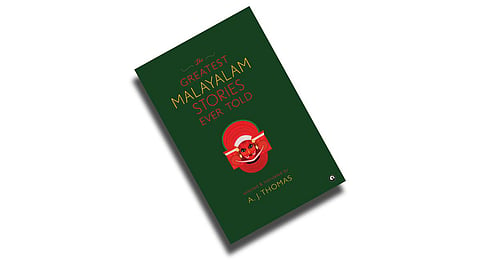

KOCHI: Is there a Malayali way of looking at the world and telling stories about it? Author and translator A J Thomas believes there is. The Greatest Malayalam Stories Ever Told (Aleph) is a compilation of 50 short stories by some of the most celebrated writers of Kerala, selected and translated by Thomas.
In these stories, all of which were written after 1950 and what Thomas calls “modern classics”, the figure of the Malayali emerges as someone who is given over to sober realism on the one hand and hallucinatory fantasy on the other. They can be bitingly satirical and pressingly political. Sometimes they talk poetically or crack jokes, at other times they are sparse, bare-boned. But they are great storytellers always.
Several stories in the compilation are set outside the state of Kerala, from Delhi to the hills of Kashmir to the Andaman Islands and even abroad. They portray the migratory Malayali, who partakes in various cultures and ways of life, while retaining the “Malayaliness”, as Thomas puts it.
Lunch, by the humourist V K N, is a story from his famous Payyan Series, which follows the adventures of Payyan, a “sophisticated” and “adequately degenerate young journalist” who strikes up a friendship with the high society of 1960s Nehruvian Delhi.
Stories such as Dhirendu Majumdar’s Mother by Lalithambika Antharjanam, Humans and Animals by Nandanar and The Death of Makhan Singh by T Padmanabhan have the Partition of India as their subject.
“Lahore is now in Delhi!” thinks a fatigued Makhan Singh, who lost his family in Lahore to the Partition and is never really at home in Delhi. “In the characterisation of Makhan Singh, one can discern a certain Malayali sensibility at play. In portraying him as a peace-loving Punjabi farmer, T Padmanabhan draws heavily from his feelings about farmers back home,” says Thomas.
“Wherever the Malayali is in the world, he responds to his surroundings and situations like a Malayali would. In that sense, it is always a Malayali experience.”
Different strands
The 50 writers whose stories are compiled in the book constitute a band of varied sensibilities and experiences. From Vaikom Muhammad Basheer, a pioneering figure in modern Malayalam fiction, to feminist Kamala Das.
“While writers before him wrote in a language traditionally set apart for literature, Basheer wrote many of his stories in the language of everyday speech, the patois of the uneducated Muslim population in his native Kottayam district.” His stories were hilarious, often poignant, critiques of society.
The World-renowned Nose, his “mighty hyperbole of a story”, is an account of how a poor and unassuming young man’s life changes when his nose starts growing exponentially one day. Journalists from across the globe rush to report on him. Political parties are formed and public opinion is split, all over the young man’s nose.
Madhavikutty, more popularly known as Kamala Das, wrote unabashedly about the struggles and desires of the modern woman with a force and urgency that shook the male-dominated Malayalam literary establishment. Her Scent of a Bird, set in Calcutta, employs striking imagery and points towards the anxieties of a woman who wishes to be financially independent.
Translating the stories posed its own set of challenges for Thomas. Translating the distinct sonic qualities of Malayalam into English is difficult, he admits. Basheer’s colloquialism or V K N’s lingual innovativeness does not lend itself to easy translation. Writers such as Paul Zacharia and Thomas Joseph devised their own distinct idiom and style that is deeply rooted in the innovative use of language.
Thomas abided by an advice given to him by the renowned poet O N V Kurup, whose poems he had translated. “He was a very practical man. He told me to translate the poetry of his lines and not do it word for word. Translate it into something that would stand as poetry in English, he said,” says Thomas. He says that he has translated the stories in a “neutral language” retaining the narrative.
Intellectual lineage
The stories are marked by literary and philosophical influences from across the world — from Freud and Marx to Sartre and Camus. Western influences are drawn on alongside classical Indian texts and folklore.
Malayalis enjoy a “culture of reading”, says Thomas. Readers are a common sight in the state. Public libraries and reading rooms abound. In tea shops, people are seen hunched over their newspapers and magazines as their teas go cold. “Young people can be found reading on their phones while waiting for a bus or a friend.”
The Greatest Malayalam Stories Ever Told offers an intimate look into the life of the Malayalis, what they love and what they hate, what they dream about and what makes them laugh, but above all, how they have changed with a changing world.